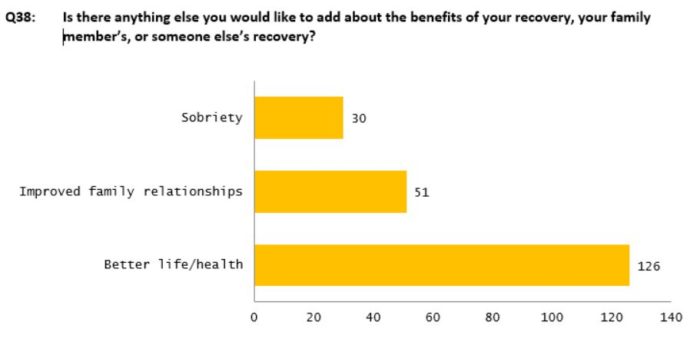In 2016, FOR-NY created a state-wide survey that was distributed to individuals and families living in recovery from addiction, families who lost a loved one to addiction, and people who have otherwise been impacted by addition. Almost 1700 people across New York participated in FOR-NY’s first recovery needs assessment. Over the last few months, we have highlighted specific focus groups and recovery-oriented systems of care in a series of special reports. In this month’s last special report on our series on Recovery in the Empire State, we turn our attention to the profound benefits of recovery.

Our Interpretation: Recovery from addiction has profound benefits. The benefit of recovery most often cited by survey respondents was better health and a better life. Other benefits were improved family relationships and sobriety.
In summary, this evidence based research from FOR-NY’s report Recovery in the Empire State shows what we have long-known anecdotally: barriers to access to treatment must be removed, and recovery wrap-around services – including safe sober housing, legal support, employment and education – are all necessary to sustaining recovery and overall well-being. Similarly, individuals and families must have access to support from many “pathways” to recovery.
The process of recovery is very personal and may involve many pathways. These recovery pathways may include clinical services, medication-assisted treatment, faith-based practices, mutual aid, peer support, exercise, meditation, nutrition, and other forms of self-care and wellness. Community-based recovery supports and services are critical to help individuals build and sustain their recovery.
As FOR-NY partners with individuals, families, and allies to the recovery community across the state, continued efforts will focus on reducing stigma and discriminatory policies and practices around addiction and recovery, to spread the message of hope that recovery is not only possible – but available to all who want it.
Research shows that “recovery is not only possible for the over 23 million Americans still struggling with addiction, but also that in recovery, people lead full, productive, and healthy lives.” [1]
[1] Laudet A. 2013. Life in Recovery Survey. Washington, DC: Faces and Voices of Recovery. Available at: www.facesandvoicesofrecovery.org/publications/lifeinrecoverysurvey.php
